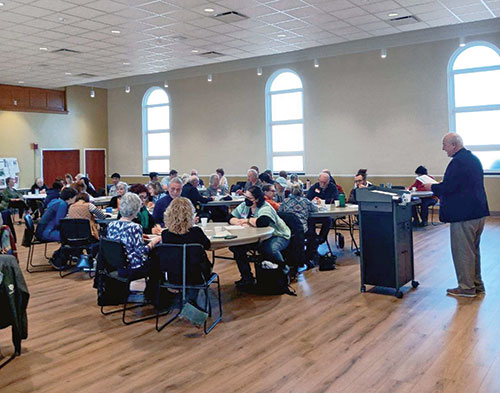Parishioners’ voices are heard at synod listening sessions

Ken Ogorek, executive director of the archdiocesan Secretariat for Evangelizing Catechesis, speaks on March 16 at St. Mark the Evangelist Parish in Indianapolis during a Synod of Bishops listening session. (Submitted photo)
By Sean Gallagher
Catholics from across central and southern Indiana gathered recently to help contribute to the preparations for the second assembly of the Synod of Bishops on synodality that will be held at the Vatican in October.
Listening sessions were held on March 16 at St. Mark the Evangelist Parish in Indianapolis and on March 23 at St. John Paul II Parish in Sellersburg.
A report on the sessions has been submitted to the U.S. Conference of Catholic Bishops, which will compile similar reports from dioceses across the country and then send a report to the Vatican in preparation for the October meeting. The local report, in English and in Spanish, is posted on the archdiocesan website at www.archindy.org/synod.
Last October, bishops, priests, religious and lay Catholics from around the world took part in the first meeting of the synod on synodality. Meetings of Catholics from around the world were held more than a year before that meeting—including some in the archdiocese—that helped in the preparations for the Vatican gathering.
Ken Ogorek, executive director of the archdiocesan Secretariat for Evangelizing Catechesis, helped guide the two recent listening sessions at which nearly 100 Catholics from more than 12 parishes took part.
“The process we used was very intentional in allowing each person to share her or his feelings and thoughts uninterrupted while folks around the table listened deeply,” Ogorek said. “When asked, near the end of each session, participants expressed great appreciation for the process—even saying that what was modeled for them can be employed effectively in their parish settings.”
This format mirrored the process, known as “conversations in the Spirit,” that was used at the first assembly of the Synod of Bishops on synodality.
“I think the process used throughout this synod, … or a modified version of the process, can help get meeting participants over the hump of collective monologues and into the territory of deep, authentic listening to each person present,” Ogorek said. “We might not all agree on everything. But when people know they’ve been heard, they can be willing to embrace teaching and direction with a sense of peace in the midst of challenge.”
The report on the listening sessions noted that its participants emphasized the need for the Church “to be more welcoming and inclusive”; “the importance of acknowledging and embracing the teaching of our Church”; and “the value of lifelong learning in the faith—especially as it helps equip us for mission.”
According to the report, one participant connected the purpose of the listening sessions to the overall mission of the Church.
“All of these listening sessions mean next to nothing if they are not for the primary and definitively outlined purpose of saving souls,” the participant said.
“I encourage people to read our report and ponder, prayerfully, what the Holy Spirit might be telling us at this time,” Ogorek said. “Jesus figures prominently in our report—as he should. Let’s continue praying for synod participants, especially the Holy Father as he strives to know and do God’s will for our Church as well as the whole world.” †
